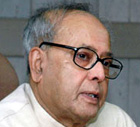
External Affairs Minister Pranab Mukherjee, who is on a three-day visit to Nepal to strengthen the bilateral relationships between the two— old, and newly formed democratic countries, assured his Nepalese counterpart that India would give its absolute support to the Himalayan nation’s transition to democracy.
On the very first day of his arrival, Mukherjee addressing the Nepali Media said, “India will continue to stand by the people of Nepal in their transition to multiparty democracy and to extend strong support as they desire.”
This is the first high level Indian delegation after the formation of the Maoist government in August this year.
The six-member delegation led by Mukherjee reached Nepal on Monday. Mukherjee discussed the political situation with Nepali Congress leader Sher Bahadur Deuba and CPN-UML general secretary Jhalanath Khanal.
The delegation will meet President Ram Baran Yadav and Prime Minister Pushpa Kamal Dahal ‘Prachanda’ on Tuesday along with former prime minister and Nepali Congress chief Girija Prasad Koirala.
Apart from discussing the bilateral ties of the two countries, India and Nepal are expected to review the 58-year-old Friendship Treaty in view of the contemporary realities and to exploit the immense hydel power resources of Nepal jointly for mutual benefit. The two countries are also expected to discuss the other treaties signed between them in the past.
Mukherjee will also make an aerial visit to the Koshi site, where the Indian engineers are rebuilding the Koshi embankment, a breach to which had caused unparallel floods in North Bihar recently.
Security concerns for Indian business in Nepal and China’s growing presence in the Terai region, the Indo-Nepal border area, will also come up for discussion. As per the high-level ministerial sources, securities for Indian business operations still a matter of concern there as a substantial guerrilla Maoist forces are yet to bring into the mainstream democratic system.
The increasing Chinese presence in the sensitive Terai region has raised an alarm for the Indian government as Chinese literature and other study materials are being taught to the local people as a part of the propaganda war. A considerable number of Chinese people are also present in the area.
Prime Minister Prachanda during his first visit to India in September after the formation of Maoist government had tried to allay the India’s apprehension of growing Nepal-China ties, saying Nepal believed in maintaining friendly relations with all neighbouring countries, and assured India that it will never allow its land for anti-India activities.
|
|
Read More: Baran


Comments: